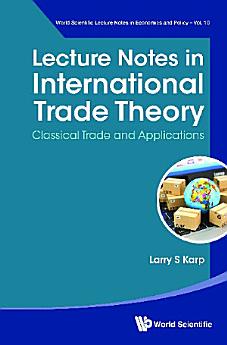Lecture Notes In International Trade Theory: Classical Trade And Applications
Larry S Karp
Dec 2021 · World Scientific Lecture Notes In Economics And Policy Book 10 · World Scientific
Ebook
304
Pages
family_home
Eligible
info
reportRatings and reviews aren’t verified Learn More
About this ebook
Lecture Notes in International Trade Theory covers classical international trade models (including the Ricardian, Ricardo Viner, and Heckscher-Ohlin-Samuelson models). The course is designed for M.Sc. and first year PhD students. It relies on both graphical and analytic methods, requiring only intermediate microeconomics and a solid grounding in calculus. The material emphasizes 'second-best' settings, where markets are imperfect. The goal is to equip students with a good enough understanding of open-economy general equilibrium relations that they understand how distortions ripple across different markets, e.g. commodity and factor markets. The Author applies these ideas to environmental and natural resource problems, including pollution 'leakage' (where pollution reductions in one country are offset by trading partners' increased pollution) and imperfect property rights. Other applications include the general equilibrium effects of commodity and trade taxes, international transfers (the 'transfer problem'), minimum wage constraints, and immiserizing growth. The Author assumes that students have some experience in formulating and answering comparative statics questions in an optimization setting. Building on these skills, and developing the idea of stability in an equilibrium setting (the Marshall Lerner condition), students learn how to formulate and answer comparative static questions in trade models.
Rate this ebook
Tell us what you think.
Reading information
Smartphones and tablets
Install the Google Play Books app for Android and iPad/iPhone. It syncs automatically with your account and allows you to read online or offline wherever you are.
Laptops and computers
You can listen to audiobooks purchased on Google Play using your computer's web browser.
eReaders and other devices
To read on e-ink devices like Kobo eReaders, you'll need to download a file and transfer it to your device. Follow the detailed Help Center instructions to transfer the files to supported eReaders.







